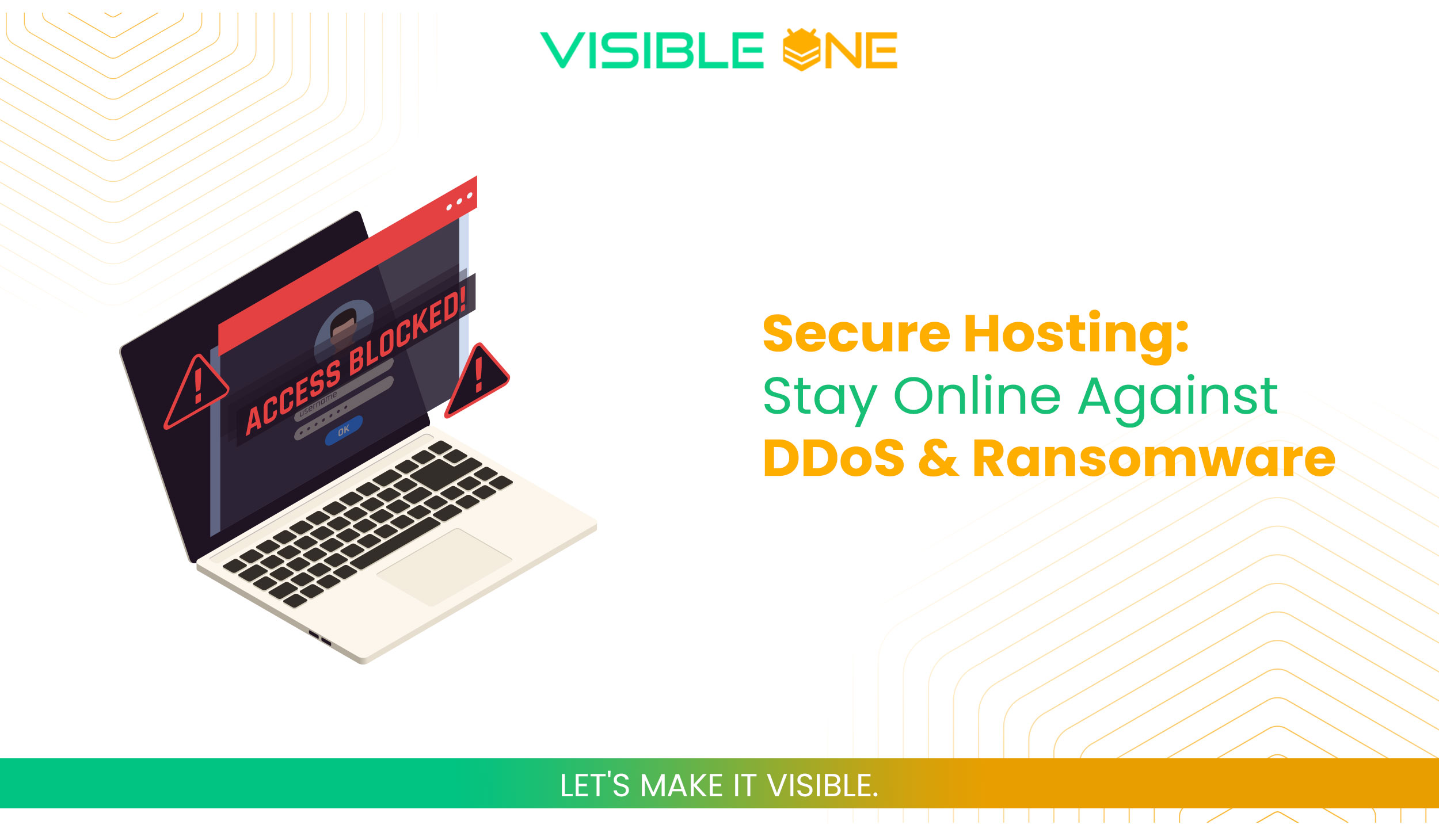Secure Hosting: Stay Online Against DDoS & Ransomware

In a world where cyber threats are escalating daily, businesses can’t afford downtime caused by attacks like Distributed Denial of Service (DDoS) or ransomware. Did you know that a DDoS attack can cost a small-to-medium-sized business upwards of $120,000 per incident, while ransomware attacks average a staggering $1.85 million in recovery costs? With such high stakes, the choice of secure hosting becomes crucial. Effective secure hosting is your first and strongest line of defence, ensuring your online presence remains reliable, resilient, and resistant to attacks.
Here’s how secure hosting protects your business, safeguards customer data, and ensures continuous uptime.
What is Secure Hosting?
Secure hosting is a comprehensive approach to web hosting designed specifically to protect your website and applications against cybersecurity threats such as DDoS and ransomware. It involves robust infrastructure, advanced threat mitigation technologies, frequent security audits, and proactive monitoring to identify and neutralise threats swiftly.
Unlike standard hosting, secure hosting goes beyond basic firewall protections and SSL certificates. It actively combats sophisticated attacks through integrated systems, significantly reducing your vulnerability to costly disruptions or breaches.
The Growing Threat of DDoS and Ransomware
Cyberattacks continue to evolve, becoming more sophisticated, frequent, and devastating. Two threats stand out due to their potential to completely halt operations:
- Distributed Denial of Service (DDoS): These attacks overwhelm your servers with fake traffic, rendering your website or online services inaccessible. They cause prolonged downtime, financial losses, and damage to your reputation.
- Ransomware: Malicious software that encrypts your files and demands payment for their release. Ransomware can cripple operations, compromise data, and incur huge recovery costs.
The need for secure hosting is clear, especially as these threats become more common and sophisticated.
Essential Components of Secure Hosting
Advanced DDoS Protection
Secure hosting providers utilise advanced filtering techniques, traffic shaping, and AI-driven analysis to detect and neutralise DDoS attacks in real-time, ensuring uninterrupted service.
Regular Data Backups
Reliable, secure hosting solutions perform automated backups regularly, allowing for quick recovery after ransomware or data breaches, without paying a ransom.
Intrusion Detection & Prevention Systems (IDS/IPS)
IDS/IPS actively monitor network traffic, alerting administrators to potential threats while proactively blocking suspicious activities, significantly reducing attack vectors.
Strong Firewalls and Web Application Firewalls (WAF)
A robust firewall, complemented by a Web Application Firewall (WAF), protects web applications from common vulnerabilities, like SQL injections or Cross-site Scripting (XSS), strengthening your defence against potential breaches.
Encrypted Data Storage and Transmission
Secure hosting ensures all stored data and communication channels are encrypted, preventing sensitive data exposure, even during attacks or breaches.
Proven Strategies for Staying Secure
Implement Multi-layered Security
Multi-layered security involves combining physical security, network protections, application safeguards, and data-level defences. The layered approach ensures that attackers who penetrate one level still face multiple additional barriers.
Regular Security Audits and Updates
Routine security audits identify vulnerabilities early, allowing proactive patching. Regular software updates and patches ensure your systems remain protected from newly discovered threats.
Continuous Monitoring
Real-time monitoring by security experts or AI-driven systems ensures immediate detection and rapid response to emerging threats, reducing response time and preventing escalation.
Incident Response Plans
Preparing a clear and actionable incident response plan ensures swift recovery following attacks. Regularly updated and tested, these plans significantly minimise downtime and financial loss.
Employee Training & Awareness
Educating employees on cybersecurity best practices significantly reduces your vulnerability. Staff trained to recognise phishing attempts, suspicious activity, or unusual access patterns become crucial frontline defenders.
Choosing the Right Secure Hosting Provider
Opting for reputable, secure hosting providers, like Cloudflare, AWS Shield, or SiteGround, ensuresa built-in security infrastructure, advanced DDoS mitigation, and rapid ransomware recovery features.
Real-World Examples: Success Against Attacks
Companies that leverage secure hosting have successfully mitigated severe cyberattacks:
- Cloudflare successfully neutralises millions of DDoS attacks annually, protecting thousands of websites and services worldwide.
- AWS Shield provides automatic, always-on detection and mitigation, ensuring continuous availability, even during major DDoS incidents.
These examples demonstrate that secure hosting isn’t merely an option—it’s an essential investment in your business continuity.
Step-by-Step Guide to Implement Secure Hosting
Follow these practical steps to implement secure hosting for your business:
- Choose a Reputable Provider: Select a secure hosting service with built-in DDoS and ransomware protection.
- Configure Essential Security Measures: Enable firewalls, WAFs, intrusion detection systems, and encryption protocols.
- Set up Automated Backups: Regular backups ensure quick recovery from ransomware or data corruption incidents.
- Monitor and Optimise: Continuously monitor your hosting environment, adjust configurations, and promptly respond to security alerts.
- Develop and Test Incident Response Plans: Regularly update your plans and conduct simulations to ensure rapid response and minimal downtime.
Secure hosting isn’t just an option—it’s essential for every business serious about remaining online and protecting valuable data. By choosing secure hosting, businesses can proactively mitigate DDoS attacks, neutralise ransomware threats, and ensure continuous operations without interruption.
Take action today—secure your digital presence with hosting that ensures robust protection against emerging threats. Your business continuity depends on it.
